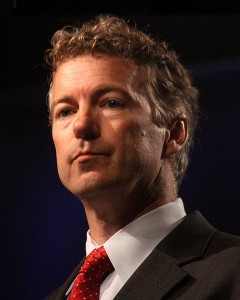Apparently, segments of the GOP political apparatus are trying to put the kibosh on Sen. Rand Paul’s presidential run before it is even officially announced. Paul’s 2016 Republican contenders and their wealthy backers hate his foreign policy so much that they are willing to spend time and resources to destroy his electoral chances.
 Reason‘s Matt Feeney has posted a round up of right-wing loathing for Rand Paul’s foreign policy (or, rather, what they think his foreign policy views are) and of recent reporting on GOP plans to shoot Paul’s embryonic presidential campaign dead in its tracks.
Reason‘s Matt Feeney has posted a round up of right-wing loathing for Rand Paul’s foreign policy (or, rather, what they think his foreign policy views are) and of recent reporting on GOP plans to shoot Paul’s embryonic presidential campaign dead in its tracks.
“According to several donors at the Republican Jewish Coalition conference held in Las Vegas last weekend,” Feeney writes, “the billionaire casino magnate Sheldon Adelson is prepared to fund a campaign against Sen. Rand Paul (R-Ky.) if he picks up increased support during his widely anticipated presidential run in 2016.”
Among DC politicos, it is a near-consensus that Rand Paul’s alleged foreign policy views will handicap him in the GOP primaries. Republicans, they say, just aren’t going to go for anything less than demagogic diatribes disparaging peaceful diplomacy as weak and naive. Right-wing primary voters need the comforting reassurance that their GOP presidential candidates will issue hard-line sermons about the need to bomb Iran, to intervene in Syria, to meddle in Ukraine, and to maintain global primacy through the use of force, coercion, and an ever-expanding military budget that is beyond reproach.
That might be true, but then why does Adelson et al. feel the need to spend hundreds of millions of dollars trying to cripple the Paul campaign? I wonder.
There are two issues at play here. The first is what Rand Paul’s foreign policy views actually are, and the extent to which perception and reality differ. The second issue is the fact that the mainstream foreign policy spectrum has become so belligerent and fringe that the basically establishment views of Rand Paul get vilified as ideologically extreme and unworkable.
Something similar happened during the fight over Chuck Hagel’s confirmation as Obama’s Secretary of Defense. You see, Hagel committed some cardinal sins for a Republican. He criticized Israel’s inhumane treatment of the Palestinians and called out the pro-Israel lobby in Washington, DC. He spoke out against the Iraq war, describing it as “a dangerous foreign policy blunder.” He suggested economic sanctions aren’t an effective foreign policy tool. Hagel even expressed an openness to cut defense budgets!
Appalling stuff, I know. For these thought crimes, Hagel was attacked as an extremist anti-Semite whose views are dangerously outside the mainstream. I actually had to write an Op-Ed at the conservative Daily Caller arguing that Hagel’s foreign policy views were not extreme or isolationist, but firmly within the traditional boundaries of the mainstream. It’s just that what passes for mainstream in the GOP these days is the kind of uninformed pugnacity that you’d think would thrive mainly on the fringes.
On whatever foreign policy issue is hot at the time, the right-wing invariably holds that America must do more, we must act and react forcefully. If we can’t act militarily, we must walk that line and convince the world that U.S. bombs and troops will be forthcoming if Washington faces anything other than absolute fealty on the international stage. Anything less than issuing threats or actually using force is condemned as weakness or appeasement.
On Ukraine, the Republican right insisted on an immediate show of force demonstrating military preparedness with NATO allies. It was also imperative to impose harsh sanctions on Russia and to combatively face down Putin.
But there were plenty of mainstream voices calling for calm and restraint. Henry Kissinger urged prudence. “Public discussion on Ukraine is all about confrontation,” he lamented, arguing that “the demonization of Vladimir Putin is not a policy; it is an alibi for the absence of one.” He advised that “the United States needs to avoid treating Russia as an aberrant to be patiently taught rules of conduct established by Washington.”
Continue reading “Unluckily for Rand Paul, The GOP Has No Room for Mainstream Foreign Policy”



